Picking the best dog food for your German Shepherd can be a challenging task. You want to keep your “Germinator” happy and healthy. As a large-active breed, you need to keep his diet balanced and packed with high-quality protein. Therefore, you have to make plenty of decisions, from considering Fido’s life stage and health requirements to ensure that she gets all the proper nutrients from the highest quality sources. All of this with the abundance of information might be overwhelming.
I used my 12 years of Veterinary experience and reviewed over 100 dog food products to find the best dog food for German Shepherds.
After considering the nutritional needs along with genetic health conditions that German Shepherds tend to have, I found that “Nutro Ultra Large Breed Adult Dog Food” is the best overall food for adult German Shepherds. In addition to meeting my dietary criteria for German Shepherds, it has the best combination of nutrients and quality sources.
But I understand that no two German Shepherds are alike, and your German Shepherd might have a different life stage or have different needs. That’s why I prepared a shortlist of the best German Shepherd foods that address the most common German Shepherd needs.
In addition to picking the best products for your pooch, I outlined my process for choosing dog food. I want you to know what gets inside the furry stomach. The process is written in plain & simple English that will help you make wiser dietary decisions for your German Shepherd.
I encourage you to read our review process and check out our in-depth reviews below so that you’ll be able to come up with your own dietary decisions.
Let’s get started.
Before You Pick The Best Food For Your German Shepherd
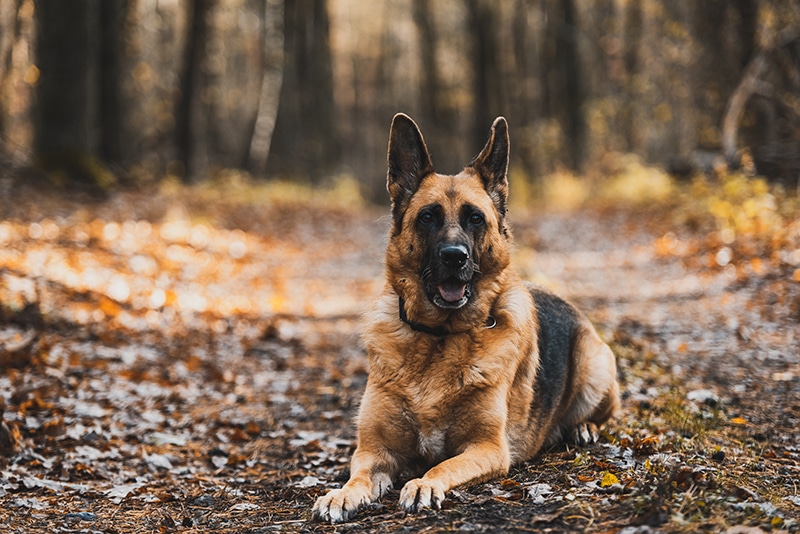
There’s no such thing as one food that fits all German Shepherds. While I did my best to find the best food for most German Shepherds, you might prefer to pick a more specific formula.
That’s why I elaborate here our main considerations while reviewing the best dog foods for German Shepherds.
You can divide your research journey into 3 steps:
- First, pick the right food for your German Shepherd’s life stage – Puppies, Adults, and Senior German Shepherds are in different development stages. Their joints, bones, and muscles develop at a different pace. That’s why you’ll need to pick the proper nutrients in the correct quantity for your German Shepherd’s life stage.
- Picking the right food to reduce common German Shepherd health issues – Each dog breed has an increased risk of catching certain health conditions. These health conditions are genetic and German Shepherds are not indifferent. So make sure to pick the right ingredients to support common German Shepherd health issues.
- Picking suitable nutrient sources – Sometimes two dog foods might seem similar. Both could provide the same nutritional value. However, it’s essential to question how these nutrients were sourced. We want to avoid chemicals and low-quality nutrients that can introduce some side effects.
The rest of the guide will show you how to pick the right food for your German Shepherd’s life stage, how diet helps in common German Shepherd health issues, and what to look for on the label.
For your convenience, I (Dr. Libby Guise) shortlisted 14 dog foods. These foods were carefully selected and should satisfy your German Shepherd’s needs. I also noted which food is best for certain life stages or particular health issues.
After going through the shortlist, you can find additional considerations that might be of interest to you and your fur-baby.
Finally, I answered the most popular questions that I’m being asked regarding German Shepherds’’ nutrition and diet.
Please keep in mind, while I tried to do my best to find the best food for your German Shepherd, it would be a good idea to understand how and why we made our decisions.
The recommendations in this review are not intended to replace the doctor-patient relationship. Always consult your veterinarian before making major adjustments to your furbaby’s diet.
The Right Diet For Puppies, Adults, And Seniors GSDs
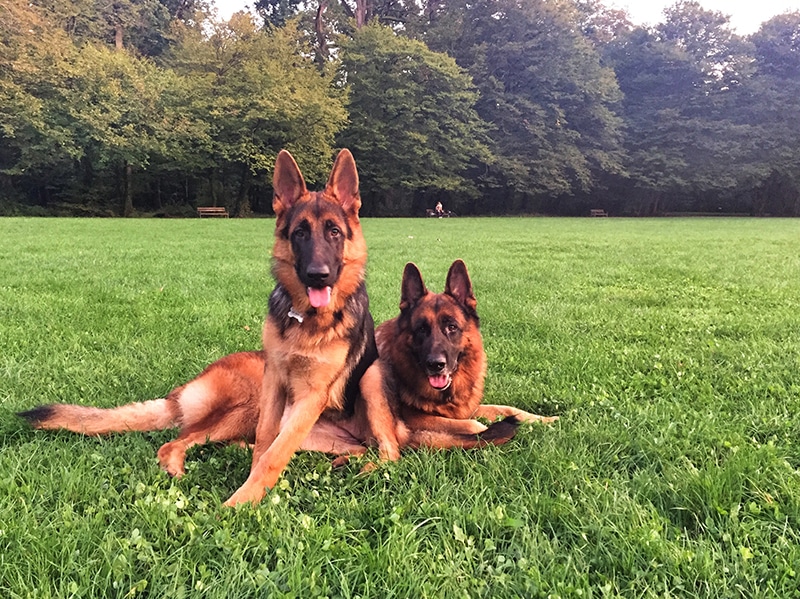
As large-breed working dogs, German Shepherds are active, high-energy pups. Therefore, they need a protein-rich diet from animal sources and sufficient fat to fuel their needs. This will vary based on your furbaby’s age and life stage:
- Puppies – Shepherd babies grow rapidly in their first year. They need a protein-rich diet for lean muscle growth and a careful balance of calcium and phosphorus to ensure proper bone development. Foods with omega fatty acids also support the brain, skin, and hair.
Your energetic pooch will need a rich energy supply from healthy fats and digestible carbohydrates. Select a puppy food that’s made for large breed dogs in order to meet your pal’s specific nutritional needs.
- Adults – The activity level and muscle mass of a German Shepherd demand a diet that’s higher in protein. A moderate carb and lower fat content(5-8%) can help fuel your pup’s lifestyle while preventing unneeded weight gain. Fats should come from healthy sources of omega fatty acids.
Because shepherds are prone to joint disease, look for ingredients that provide natural sources of glucosamine and chondroitin. Digestible foods from whole grains, fruits, and help to provide antioxidants, vitamins, and minerals that your pooch needs. These pups can also develop heart conditions, so aim for lower sodium diets that include taurine.
- Seniors – As your shepherd reaches his senior years, his activity level and energy needs will decline. Focus on a higher fiber diet to support digestion and lower caloric content. Natural sources of glucosamine and chondroitin can help provide joint support and may ward off degenerative changes. Continue to provide moderately high protein and low-fat meals to maintain lean muscle mass and healthy skin and hair.
Daily Calorie Requirements
- Puppies – A puppy’s caloric needs will change as they grow and gain weight. Use the feeding guidelines on the package as a starting point. You can adjust up if you can see your pup’s rib cage and down if you can’t feel the ribs when you gently palpate his side.
- Active Adults – A healthy adult that exercises regularly generally needs about 1740-2100 calories per day. You can follow the high end of the package guidelines on your pup’s food to determine how much product to feed each day and adjust as needed.
- Inactive Adults and Seniors – If your pup is less active, the energy needs will be lower. Target about 1272-1540 calories per day. The package label should provide a range of how much you should feed. Start on the low end and increase or decrease the amount if you notice a change in your pal’s weight.
Feeding Quantity & Frequency
- Puppies – You should be bringing a new puppy home when he’s between 8 and 10 weeks old. That way, he’ll be ready for weaning and transitioning to puppy food. As you transition to puppy kibble, we recommend that you start with a “puppy mush” by soaking the dry food in water or formula to make it soft and easy to digest. By 12 weeks, you can slowly switch to dry food. Feed 90% mush and 10% dry for a week and slowly change the proportions (10% at a time) over the next few months.
When you first bring your pooch home stick with the food the breeder has been using until your new family member adjusts to his home. After a week or two, begin a slow transition by mixing a small portion of the new product into the breeder’s food. Increase the ratio of the new food over one to two weeks.
Puppies should be fed frequently to provide consistent nutrition to fuel their rapid growth and high activity level. Start with 3-4 meals per day until they reach about 6 months. Once your pooch is ½ year old, you can transition to 2-3 meals per day. By 1 year, your furbaby will be ready to eat twice daily.
- Adults and Seniors – Although you can feed German Shepherds once a day, we recommend dividing his food into morning and evening meals. This breed has a predisposition for bloat or a twisted stomach, and feeding smaller portions may help to prevent the condition.
The Appropriate Nutrition For Common GSD Health Issues

Some health conditions are more popular among German Shepherds than other dog breeds. Each breed inherits some genes that can be associated with certain health issues.
It doesn’t mean that Fido is going to develop these conditions. It just means that German Shepherds have a higher chance as compared to other breeds.
However, it’s possible to reduce the risk by proactively feeding the German Shepherd with the right nutrients. Here we list the most common German Shepherds health issues and how certain nutrients can reduce risk.
A quick reminder: if you think your special pal suffers from any of these conditions, schedule an exam with your veterinarian to confirm your suspicions. Even with healthy dogs, these dietary recommendations may help prevent future problems. Always check with Fido’s doctor before making changes in his diet.
Food Intolerances
Some German Shepherds have a genetic tendency to develop a food allergy or intolerance. Unfortunately, chicken is one of the ingredients that top the list of problem foods for these dogs. If your pooch develops an allergy to chicken, you may notice:
- Excessive paw licking
- Hair loss
- Respiratory symptoms including sneezing and wheezing
- Irritated skin
- Rubbing or scratching at the ears
- Digestive problems including flatulence and diarrhea
To determine the root of the food intolerance, you may need to try an elimination diet. Pups with a chicken allergy often thrive on fish or rabbit-based proteins and limited ingredients that are free of common allergens such as soy, wheat, dairy, and beef.
Joint Problems – Elbow and Hip Dysplasia
Shepherds are also prone to develop hip or elbow dysplasia. With these conditions, the joint develops improperly, often resulting in a shallow socket. As a result, the bones tend to move more than in a normal joint and rub against one another. This leads to wear and tear that creates painful inflammation and degenerative changes. To help prevent or minimize the effects of dysplasia, keep your dog at a healthy weight. Unwanted pounds add stress on the joints and limbs. You can also look for foods that include:
- Omega 3 fatty acids to combat inflammation
- Calcium and phosphorus for strong bones
- Iron to combat autoimmune induced anemia
- Vitamin C to support tissue repair
- Glucosamine and chondroitin for cartilage support
Osteochondrosis
German Shepherds can be prone to osteochondrosis (OCD). In OCD, the cartilage separates from the bone, resulting in pain and inflammation. This condition occurs around 6-9 months and may be more common in dogs that get excessive calories and too much calcium in the diet. Make sure your puppy has food that has moderate energy levels and a proper balance of calcium and phosphorus for healthy bone growth.
Gastric Dilatation-Volvulus/Bloat
Deep-chested dogs like the German Shepherd can be prone to bloat or gastric dilatation-volvulus (GDV). The condition occurs when the stomach becomes distended with gas, fluid, or digested food then twists on its axis. As a result, the pooch is unable to expel the food or gas. Left untreated, this condition quickly advances to a life-threatening situation. Fortunately, there are some things you can do to help prevent GDV:
- Divide your pup’s daily ration into 2-3 smaller meals.
- Avoid formulas that list oil or animal fat in the top four ingredients.
- Limit activity for an hour or two after meals.
- Discourage drinking large quantities of water at one time.
- Prevent your pooch from gulping his dinner. Select larger-sized kibble, and consider using a slow feed dog bowl.
Cardiomyopathy
When it comes to the heart, German Shepherds may suffer from a heart condition known as dilated cardiomyopathy (DCM). With this disease, the outer walls thicken, and the organ can’t pump efficiently. It can lead to heart failure and fluid buildup in the lungs.
You may be able to help prevent or manage heart disease through the diet:
- Provide a formula with quality, whole-food ingredients.
- Watch the sodium levels. The more advanced the heart disease, the more you should restrict the amount of sodium in the diet:
- No symptoms – <100 mg/100kcal
- Early stages, mild symptoms – <80 mg/100kcal
- Advanced stages, <50 mg/100kcal
- Use a high-protein diet with real meat to prevent muscle wasting.
- Look for heart healthy-supplements including carnitine, taurine, omega 3 fatty acids, magnesium, and B-vitamins
Aortic Stenosis
Aortic Stenosis is a genetic heart condition in which fibrous tissue causes a narrowing of the aorta. As a result, the ventricle can’t empty properly. Dogs with aortic stenosis may show muscle weakness, faint unexpectedly, or have difficulty breathing. In mild to moderate cases, you can manage the problem with medications, restricted activity and excitement, and a diet that features low sodium and high-quality ingredients.
Hypertrophic Osteodystrophy
As rapidly growing pups, German Shepherds can suffer from Hypertrophic Osteodystrophy. With this condition, inflammation develops beneath the growth plates of rapidly growing long bones. The area swells resulting in painful, swollen joints, lameness, and fever. Both overfeeding your pup and providing too much calcium in the diet contribute to rapid bone growth that can cause Hypertrophic Osteodystrophy. Provide food with the proper balance of essential minerals, and don’t free-choice feed your shepherd.
Corneal Dystrophy
With corneal dystrophy, a pooch has a genetic defect that impairs its ability to metabolize fat properly. Over time, the corneas of each eye begin to cloud over. Fortunately, the condition is usually minor in shepherds and should not result in blindness or discomfort. There is no treatment for the disease, but feeding a higher fiber, lower fat diet can help minimize the effects.
Degenerative Myelopathy
Another genetic disease, degenerative myelopathy involves a slowly progressing degeneration of the spinal cord. Usually presenting as hind limb incoordination in senior dogs, the condition eventually results in paralysis. Because this is a degenerative disease, pooches don’t feel pain. It can, however, cause distress and be inconvenient for you and your furbaby.
Balanced nutrition can help support pups with degenerative myelopathy. Start with quality animal-based proteins that are easy to digest. Use food that includes natural sources of omega 3 fatty acids to help combat inflammation. Fish-based diets or high-quality fish oil is an excellent choice.
Hyperparathyroidism
When the parathyroid gland secretes excess amounts of the parathyroid hormone, it’s called hyperparathyroidism. The extra hormone triggers the body to absorb calcium from the bones. Dogs with hyperparathyroidism will show increased thirst and urination, decreased appetite, sluggishness, and weakness. Some dogs develop bladder or kidney stones. If the condition is due to a nutritional deficiency, there may be broken bones.
Hyperparathyroidism usually occurs as a result of a tumor in older dogs, but a deficiency of Vitamin D and calcium can trigger a secondary form in young pups. All-meat diets that are heavy in the mineral phosphorus but lack sufficient calcium may be the culprit. Feed a well-balanced diet that includes Vitamin D and a proper balance of calcium and phosphorus.
Perianal Fistula
German Shepherds top the list of dogs that are prone to develop perianal fistulas or holes in the skin and tissues that surround the anus. They may start small but eventually increase in size and become ulcerated and painful. Dogs with fistulas may lick the area frequently, be reluctant to sit, and may show pain during defecation. The cause is uncertain, and the condition difficult to treat. Offering a hypoallergenic diet may help prevent the condition as there is some evidence that food allergies could be a contributing factor. Pick formulas that have low residue, digestible ingredients and avoid Beef, chicken, and eggs.
Ensuring High-Quality Nutrients
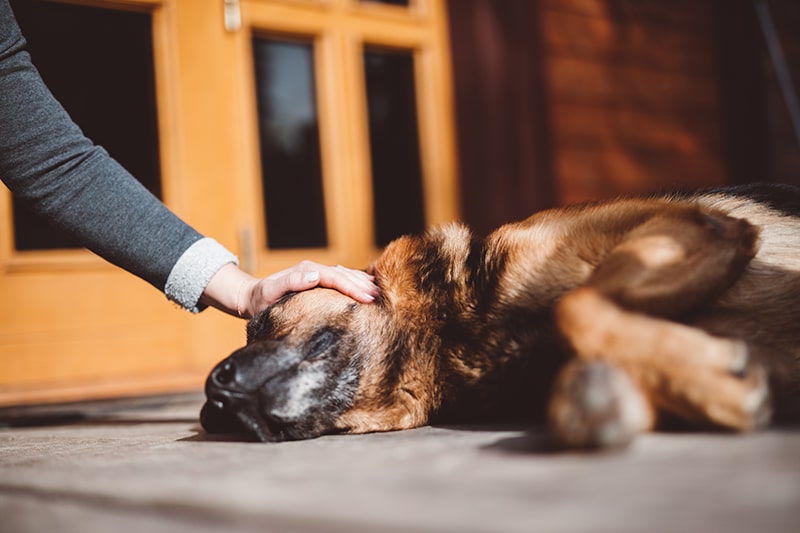
Now that you have information about the basic nutritional needs of German Shepherds and how to adjust their diets if they suffer from some common conditions, we can talk about dog food.
- Whole Protein as the Main Ingredient – Shepherds require a protein-rich diet to support their muscular build. Pick foods with animal-based sources of protein such as poultry, red meat, and fish. You should also avoid ingredients from animal byproducts or derivatives.
- Includes Probiotics and Other Helpful Supplements – Nutrition plays a major role in shepherd health.
- Active probiotic cultures to help improve digestive function
- Omega 3 fatty acids for anti-inflammatory properties and to support brain, coat, and skin health
- Balanced levels of calcium and phosphorus along with glucosamine and chondroitin for bone and joint health
- Controlled levels of sodium for heart health
- Free of Chemical Preservatives – Preservatives such as Ethoxyquin, BHA, BHT, propylene glycol, or sodium nitrate/nitrite may be linked to cancer. Look for products that use natural preservatives such as tocopherols and herbs.
- Meets AAFCO nutritional requirements for a complete and balanced food – The AAFCO provides state regulatory agencies with science-based recommendations for nutritional requirements in pet foods. Check the label for a statement that the formula is in compliance with AAFCO requirements.
- Contains Easily Digestible Ingredients- Remember that the German Shepherd can suffer from food intolerances and a sensitive stomach. Products that include easy to digest foods such as lean muscle proteins, fruits, vegetables, and whole grains helps to support proper gut function. Avoid complex carbohydrates that are harder on the system.
- Has a Minimal to Moderate Fat Content – While shepherds are active pups, they rely more on protein and carbohydrates than fat for their energy. Keep fat content low to low-moderate to help prevent unwanted weight gain and obesity. Fats should come from healthy sources that include omega fatty acids.
- Focuses on Limited Ingredients – For dogs prone to food allergies or sensitivities, limited ingredients can help you avoid problem foods. Look for short lists of ingredients that feature whole proteins, whole grains, vegetables, and fruits.
- No Artificial Colors, Flavors, or Additives – Artificial ingredients may contribute to sensitivities and other health problems. Look for colors, flavors, and additives that are from natural sources.
- Manufactured in a Handful of Countries – Check the label for the manufacturing country to ensure it comes from a place that uses reliable practices for wholesome food. Nations including the United States, Australia, and Canada follow Good Manufacturing Practices.
Our 2025 Review For 14 Dog Foods For German Shepherds
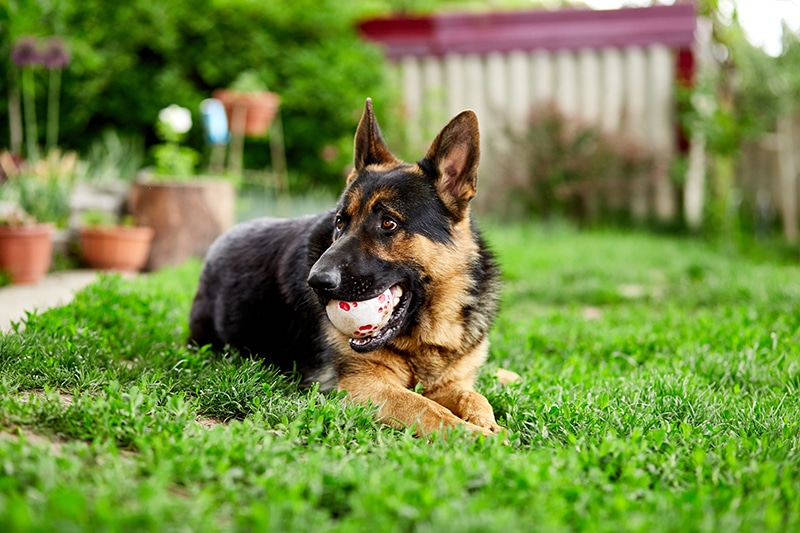
We reviewed over 100 products by following the process presented above and classified the best of them based on everyday German Shepherd needs.
We considered the life stage, common German Shepherd health issues for each pick and ensured it has the best nutrient sources.
Nutro Ultra Large Breed Adult Dog Food for German Shepherds
- First 5 ingredients: Chicken, Chicken Meal, Brown Rice, Brewers Rice, Rice Bran
- Key feature: Protein-rich formula for adults
- Guaranteed Analysis: 23% Crude Protein, 12% Crude Fat,4% Crude Fiber, 10% Moisture
- Caloric Content: 361 kcal/cup
- Type of Product: Natural Dry Dog Food
- Life Stage: Adult
- Best for: Best Overall Pick
- AAFCO Statement: formulated to meet the nutritional levels established by the AAFCO Dog Food Nutrient Profiles for Maintenance
Chicken tops the list of ingredients in this food providing a protein-rich source for your active shepherd. Lamb and salmon combine to offer a trio of proteins that supply essential amino acids for lean muscles.
With a lower fat content from healthy omega fatty acids, this formula supports a healthy brain, coat, and skin. Chicken and lamb meal add natural sources of glucosamine and chondroitin for joint health.
Digestible ingredients from whole muscles, grains, fruits, and vegetables aid gut function. The formula includes taurine for heart health and has no artificial ingredients.
Customers say their dogs love it and seem to digest it well with no tummy troubles or loose poop.
Blue Buffalo Life Protection Formula Large Breed Puppy Recipe
- First 5 ingredients: Deboned Chicken, Chicken Meal, Brown Rice, Oatmeal, Barley
- Key feature: High protein, moderate fat
- Guaranteed Analysis: 26% Crude Protein,15% Crude Fat,5% Crude Fiber, 10% Moisture
- Caloric Content: 386 kcal/cup
- Type of Product: Dry large-breed dog food
- Life Stage: Puppy
- Best for: German Shepherd Puppy
- AAFCO Statement: formulated to meet the nutritional level established by AAFCO Dog food nutrient profile for growth
With high protein, moderate fat, and the proper balance of calcium and phosphorus, this formula provides the nutrients your shepherd puppy needs to grow properly. The top ingredient is real meat for a protein-rich diet.
Healthy whole grains offer energy for an active, growing pup. Omega fatty acids including DHA and ARA come from natural sources to provide support for a healthy brain, eyes, coat, and skin.
The formula features digestible, whole foods, prebiotic fiber, and probiotics for healthy gut function. There are no artificial ingredients, corn, wheat, soy, or by-products in the food.
Customers with German Shepherds share that their dogs love the food, and it helps them grow strong.
Taste of the Wild Sierra Mountain
- First 5 ingredients: lamb, lamb meal, sweet potatoes, egg product, lentils
- Key feature: Nutrient-rich, grain-free
- Guaranteed Analysis: 25% Crude Protein,15% Crude Fat,5% Crude Fiber, 10% Moisture
- Caloric Content: 338kcal/cup
- Type of Product: Dry adult food
- Life Stage: Adult
- Best for: Senior German Shepherds
- AAFCO Statement: formulated to meet the nutritional needs established by the AAFCO Dog Food Nutrient Profiles for all stages of life
This product features lamb as the first ingredient for an easily digestible source of animal-based protein. It has a low-moderate fat content and lower caloric density to help prevent your senior from putting on unwanted pounds.
With digestible whole foods such as raspberries and blueberries, this food is easy on the gut. Prebiotic fiber and probiotics provide additional digestive support.
Lamb meal is a natural source of glucosamine and chondroitin for healthy joints, and salmon oil supplies omega fatty acids to support the coat and skin. The formula includes taurine for heart health.
Owners say this food is good for picky eaters and provides excellent nutrition.
Eagle Pack Power Adult Dry Dog Food, 40-lb bag
- First 5 ingredients: chicken meal, pork meal, ground brown rice, peas, chicken fat
- Key feature: high protein, moderate fat for an active lifestyle
- Guaranteed Analysis: 30% Crude Protein,19% Crude Fat,4.5% Crude Fiber, 10% Moisture
- Caloric Content: 445 kcal/cup
- Type of Product: Natural dry dog food
- Life Stage: Adult
- Best for: Budget
- AAFCO Statement: formulated to meet the nutritional needs established by the AAFCO Dog Food Nutrient Profiles for Maintenance
With chicken and pork meal as the first ingredients, this formula is digestible and protein-rich. It includes rice and peas as carbohydrate sources for your pal’s energy needs.
Natural sources of omega fatty acids provide support for healthy skin and coat. The ingredients include a balanced blend of essential vitamins and minerals as well as taurine for heart health.
This product has all-natural ingredients and includes probiotics for digestive health.
A satisfied owner reported that her pup enjoyed the food and had solid poops.
Chicken Soup for the Soul Large Breed Adult Dog Food
- First 5 ingredients: Chicken, Turkey, Chicken Meal, Turkey Meal, Cracked Pearled Barley
- Key feature: high protein, moderate fat
- Guaranteed Analysis: 23% Crude Protein,12% Crude Fat, 5% Crude Fiber, 10% Moisture
- Caloric Content: 374 kcal/cup
- Type of Product: Dry Food
- Life Stage: Adult
- Best for: Skin and Coat
- AAFCO Statement: formulated to meet the nutritional needs established by the AAFCO Dog Food Nutrient Profiles for Maintenance
With Chicken and turkey as the top two ingredients in this product, the formula provides real meat protein to maintain lean muscle mass. The fat content is low to moderate to help protect your shepherd from putting on too much weight.
Digestible whole grains offer healthy carbs for an active lifestyle. Whole food ingredients from fruits and vegetables such as carrots, apples, and cranberries provide rich sources of antioxidants and vitamins.
This product includes natural sources of chondroitin and glucosamine as well as omega fatty acids to help support the joints, hair, and skin. Prebiotic fiber and probiotics encourage normal digestion.
Owners say their dogs have smooth, shiny coats and energy when they eat this food.
American Journey Large-Breed Food for German Shepherds
- First 5 ingredients: Deboned Salmon, Menhaden Fish Meal, Brown Rice, Peas, Rice Bran
- Key feature: high protein, grain-free
- Guaranteed Analysis: 24% Crude Protein,12% Crude Fat,6% Crude Fiber, 10% Moisture
- Caloric Content: 327 kcal/cup
- Type of Product: Large-breed dry food
- Life Stage: Adult
- Best for: Active Lifestyle
- AAFCO Statement: formulated to meet the nutritional level established by AAFCO Dog food nutrient profile for all life stages
With real salmon as the first ingredient, this food features high-protein and moderate fat content for your German Shepherd’s needs. Brown rice, peas, oatmeal, and potatoes add digestible carbohydrates for energy.
With a balance of calcium, phosphorus, and other essential minerals and vitamins, this food provides nutrients for a healthy lifestyle. Natural sources of glucosamine, chondroitin, and omega fatty acids help to support the skin, coat, heart, and joints.
The formula includes digestible whole food ingredients such as blueberries and prebiotic fiber to support gut health. It has no artificial additives or preservatives.
Customers who feed this food to their German Shepherds say their pups have shiny coats and plenty of energy
Blue Buffalo Wilderness High Protein
- First 5 ingredients: Deboned Chicken, Chicken Meal, Peas, Pea Protein, Tapioca Starch
- Key feature: high protein, moderate fat
- Guaranteed Analysis: 34% Crude Protein,15% Crude Fat,6% Crude Fiber, 10% Moisture
- Caloric Content: 409 kcal/cup
- Type of Product: grain-free dry food
- Life Stage: Adult
- Best for: High-Protein
- AAFCO Statement: formulated to meet the nutritional level established by AAFCO Dog food nutrient profile for maintenance
This food is packed with protein. The first ingredient is whole chicken that provides essential amino acids to help maintain your pup’s muscles. The fat content is suitable to support an active shepherd.
Natural sources of omega fatty acids, chondroitin, and glucosamine help to ensure healthy joints, skin, and coat. The balanced blend of vitamins and minerals supports other body systems.
The formula contains digestible whole foods, prebiotic fiber, and probiotics for proper gut functioning. Taurine is included to support heart health.
Customers report their pups to love the flavor and have plenty of energy when eating this food.
Nutro Wholesome Essentials Adult Large-Breed Dog Food
- First 5 ingredients: chicken, chicken meal, whole grain sorghum, rice bran, split peas
- Key feature: high protein, low fat
- Guaranteed Analysis: 22% Crude Protein, 7% Crude Fat,11% Crude Fiber, 10% Moisture
- Caloric Content: 245kcal/cup
- Type of Product: Natural Dry Dog Food
- Life Stage: Large Breed Adult
- Best for: Weight Management
- AAFCO Statement: formulated to meet the nutritional level established by AAFCO Dog food nutrient profile for maintenance
Whole muscle protein is the first ingredient in this formula. Real chicken provides essential nutrients to support lean muscle mass. With low fat and moderate calories from digestible grains, this food can help your furbaby reach and maintain a healthy weight.
Natural sources of glucosamine and chondroitin support joint health. The formula includes a balanced blend of vitamins and minerals.
This food features digestible whole-food ingredients including pumpkin and kale that provide antioxidants for cellular health. There are no artificial colors, flavors, or other additives in the product.
Owners say their dogs like the flavor of the food and are able to lose weight on it.
Natural Balance LID Large Breed Formula Dog Food
- First 5 ingredients: Lamb, Brown Rice, Lamb Meal, Brewers Rice, Rice Bran
- Key feature: limited ingredient
- Guaranteed Analysis: 23% Crude Protein,14% Crude Fat,4% Crude Fiber, 10% Moisture
- Caloric Content: 370cal/cup
- Type of Product: Dry LID adult food
- Life Stage: Adult
- Best for: Sensitive Stomach
- AAFCO Statement: formulated to meet the nutritional needs established by the AAFCO Dog Food Nutrient Profiles for maintenance
With lamb as the first ingredient, this product offers a digestible, protein-rich food that’s easy on sensitive stomachs. The limited ingredients help you to keep track of your pal’s diet. There are no artificial additives in the formula.
The product contains no corn, wheat, or soy but includes healthy gluten-free grains for digestible carbohydrates.
A balanced blend of vitamins and minerals promotes whole-body health. Natural sources of glucosamine and chondroitin support joint function.
Owners who tried this food say it helps pups with sensitive stomachs have more normal digestion and poops.
Blackwood Whitefish Meal and Oatmeal Large Breed Recipe
- First 5 ingredients: Whitefish Meal, Oatmeal, Brown Rice, Pearled Barley, Ground Grain Sorghum
- Key feature: limited ingredient
- Guaranteed Analysis: 24% Crude Protein,12% Crude Fat,4% Crude Fiber, 10% Moisture
- Caloric Content: 375cal/cup
- Type of Product: Dry large breed adult food
- Life Stage: Adult
- Best for: Heart Health
- AAFCO Statement: formulated to meet the nutritional needs established by the AAFCO Dog Food Nutrient Profiles for maintenance
This product uses real meat ingredients for a digestible protein-rich food. The lower fat content from healthy omega fatty acids helps to prevent unwanted weight that can put stress on the heart.
With added taurine for heart health and whole grains as the carbohydrate source, this food offers heart-safe energy for your pooch.
Natural sources of glucosamine and chondroitin support joint function. The product contains digestive support from prebiotic fiber and probiotic microorganisms.
Customers report that their dogs like the flavor, and it helped one overweight German Shepherd lose unwanted pounds. Dogs seem healthy and happy.
Dr. Gary’s Best Breed Holistic German Dry Dog Food
- First 5 ingredients: Chicken Meal, Oatmeal, Brown Rice, Dried Beet Pulp, Chicken Fat
- Key feature: nutritionally dense
- Guaranteed Analysis: 25% Crude Protein,12% Crude Fat,4.5% Crude Fiber, 10% Moisture
- Caloric Content: 456cal/cup
- Type of Product: Dry large breed adult food
- Life Stage: Adult
- Best for: Joint Health
- AAFCO Statement: formulated to meet the nutritional needs established by the AAFCO Dog Food Nutrient Profiles for all life stages
The first ingredient in this food is an animal-based protein source to help provide the nutrients for lean muscle mass. New Zealand green-lipped sea mussels offer a natural source of glucosamine and chondroitin to support cartilage and joint function.
With Menhaden fish meal, the formula includes omega fatty acids for healthy skin and coat. The fat content and digestible grains for carbohydrates provide energy stores to fuel an active lifestyle.
Digestible whole-food ingredients provide antioxidants and fiber for healthy gut function.
Customers say their shepherds love the food and thrive on it. They have normal poops and no stomach issues.
Merrick Grain Free Large Breed Dry Dog Food Real Chicken & Sweet Potato Recipe
- First 5 ingredients: Deboned Chicken, Chicken Meal, Turkey Meal, Sweet Potatoes, Potatoes
- Key feature: grain-free
- Guaranteed Analysis: 30% Crude Protein,15% Crude Fat,3.5% Crude Fiber, 11% Moisture
- Caloric Content: 382cal/cup
- Type of Product: Dry large breed adult food
- Life Stage: Adult
- Best for: Low-Calcium
- AAFCO Statement: formulated to meet the nutritional needs established by the AAFCO Dog Food Nutrient Profiles for maintenance
Featuring a protein-rich formula from animal sources, this food is lower in calcium. The product has a moderate fat content and digestible carbohydrates for an active lifestyle.
Healthy fats from omega fatty acids support a healthy coat and skin. Natural sources of glucosamine and chondroitin promote cartilage health and joint function.
Whole food ingredients and probiotics help aid digestion. There are no artificial ingredients, corn, wheat, soy, or gluten in the formula.
Customers say their pups love the food and have energy when they eat it.
Taste of the Wild Southwest Canyon Grain-Free Dry Dog Food
- First 5 ingredients: beef, peas, garbanzo beans, lamb meal, canola oil
- Key feature: high protein, moderate fat
- Guaranteed Analysis: 29% Crude Protein,15% Crude Fat, 5% Crude Fiber, 10% Moisture
- Caloric Content: 360 kcal/cup
- Type of Product: Grain-Free Dry Dog Food
- Life Stage: Adult
- Best for: Picky Eater
- AAFCO Statement: formulated to meet the nutritional needs established by the AAFCO Dog Food Nutrient Profiles for Maintenance
With tasty beef as the first ingredient and three other protein sources, your pup will have an explosion of flavor in every bite. The high protein content and low-moderate fat supply the nutrients to fuel an active pooch and maintain lean muscle mass.
This formula includes digestible whole food ingredients such as blueberries and tomato. Prebiotic fiber and probiotics further promote gut function.
Natural sources of omega fatty acids help support healthy skin and coat. Glucosamine and chondroitin promote joint function and cartilage health. Taurine supplements are included for the heart.
Owners say even picky eaters love this food and it keeps them healthy.
Blue Buffalo Homestyle Recipe Large Breed Chicken Dinner – wet
- First 5 ingredients: Chicken, Chicken Broth, Carrots, Brown Rice, Peas
- Key feature: Ground food
- Guaranteed Analysis: 10% Crude Protein,7.5% Crude Fat, 1.5% Crude Fiber, 78% Moisture
- Caloric Content: 493 kcal/can
- Type of Product: Wet Large Breed Dog Food
- Life Stage: Adult
- Best for: Wet
- AAFCO Statement: formulated to meet the nutritional needs established by the AAFCO Dog Food Nutrient Profiles for Maintenance
With 10% crude protein from real chicken, this wet formula offers a nutrient-dense food. The ingredients include chicken broth for moisture and flavor and digestible carbohydrates.
The product includes glucosamine and chondroitin for joint health. It has no artificial flavors, by-products, corn, wheat, or soy.
Use this as a healthy main course or add it to kibble to increase palatability.
Owners say this food helps their picky eaters gobble up their dinner.
Foods That GSDs Should Not Eat
Who doesn’t love to share a taste of their favorite foods with their furbaby? If you find pleasure in giving your pal “special treats” from time to time, avoid offering your pup these foods:
- Chocolate and coffee – contain stimulants that can be deadly to dogs.
- Onions and garlic – contain a chemical that can cause anemia.
- Grapes and raisins – can cause kidney damage in dogs.
- Alcohol – dogs don’t have the same body mass or tolerance as humans
- Gum or other foods that contain xylitol can trigger life-threatening hypoglycemia
- Macadamia nuts are toxic to shepherds
- Raw yeast doughs – the yeast can ferment and create alcohol in the gut, or the dough may expand and trigger a twisted stomach
- Peach and cherry pits – can be a choking hazard and contain a toxic chemical
- Avocados – not fatal but they can make your pooch ill
- Cooked bones and all poultry bones can splinter and puncture the stomach or intestines
- Hops can trigger a dangerous rise in your dog’s body temperature
Is It Safe to Feed German Shepherds a Grain-Free Diet?
The FDA provided an update to its investigation of grain-free diets and their potential link to dilated cardiomyopathy (DCM) in dogs. Products that include peas, lentils, or a potato-based ingredient in the top ten ingredients seem to be more problematic. Because German Shepherds are one of the large breed dogs with a genetic predisposition to the disease, it’s wise to consult with your veterinarian before switching to grain-free dog food.
Frequently Asked Questions
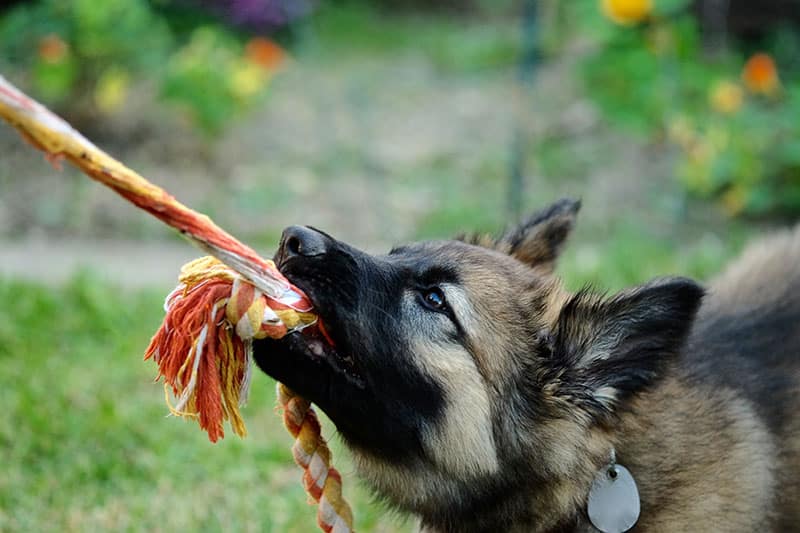
How often should I feed my German Shepherd puppy?
Young puppies need lots of energy to fuel their growth and activity. Feed them 3-4 times per day to prevent drops in blood sugar. By the time they reach 6 months, you can taper to two or at most three meals per day.
What time should I feed my German Shepherd?
Because shepherds are at risk for bloat, try to feed your pooch during low activity or quiet times. You don’t want to offer a meal immediately before or after exercise.
How long should I wait to switch my puppy to adult food?
For shepherds, you can switch to adult food when they reach about 80-90% of their full adult size. You may be able to slowly start mixing in a small portion of the adult formula around 9 months to help the system get used to the food. Then start the transition to adult kibble around 1 year.
Does a certain type of food help with gastric bloat?
There is no one type of food that helps. However, lots of grain in the formula or a high gat diet may contribute to gas production and bloat. The best preventative measure is to feed your pal smaller meals twice a day to prevent overloading the stomach.
What’s the best form of protein for your German Shepherd?
The best form of protein for a German Shepherd is from a quality animal-based source. Look for whole muscle ingredients at the top of the list.
Do German shepherds need high protein food?
Shepherds require a diet that’s higher in protein to support healthy lean muscle mass.
How much protein does a German shepherd need?
Puppies should have at least 22% protein in their food, and adults need at least 18%.
Is salmon good for feeding a German shepherd?
Cooked salmon is an excellent protein option for German Shepherds as long as there are no bones. This ingredient provides a natural source of omega fatty acids which have many health benefits. Avoid raw fish as it may have salmonella or listeria.
What meat is best for German Shepherds?
Cooked salmon or chicken are two of the best protein sources for German Shepherds. They provide the nutrients your furbaby needs
What fruits can I feed my German shepherds?
You can feed your German Shepherd a wide range of fruits including bananas, blueberries, coconut, mango, melons, papaya, pineapple, raspberries, and strawberries.
Can I give milk to my German Shepherd?
Many shepherds will become lactose intolerant after weaning and will not be able to digest milk sugars. If your pooch has digestive issues when you offer him milk, don’t. However, if your pooch can tolerate the liquid, you can offer small quantities on an infrequent basis.
Do German Shepherds have food allergies?
Not all shepherds have allergies, but there is a breed disposition. Food sensitivities and allergies are common for these pups.
Are German shepherds picky eaters?
Some German Shepherds can be picky eaters, but there are ways to help them find nutritious food that they’ll enjoy. Start with products that contain high-quality protein from real meat sources and the proper balance of healthy fats. Make sure you have a consistent feeding time and routine, keep treats to a minimum and provide a peaceful environment.
Is it OK to feed a German shepherd once a day?
While German Shepherds can tolerate one meal a day, we recommend providing two daily feedings. Smaller portions can help reduce the risk of bloat.
Why won’t my German Shepherd eat his food?
There are several reasons why a German Shepherd will stop eating:
- He may be bored with his food.
- He’s just not hungry.
- He has a tooth or gum problem that’s causing pain
- He’s a picky eater.
- It’s the wrong time of day.
- He’s feeling stressed or anxious.
- He’s ill
What is the average weight for a German shepherd?
The average male weighs between 65 and 90 pounds, and females come in at 50-70 pounds.
Why is my German Shepherd so skinny?
Some shepherds are skinny due to their genetics. This is most likely the case if your pooch has been thin since he was a puppy. However, there can also be a dietary component. Even with the right caloric content, shepherds may not maintain a healthy weight on poor-quality foods that don’t meet their nutritional needs. In the case of a high-activity dog, make sure you’re feeding enough food for his energy needs. A shepherd may also lose weight if he’s ill or experiencing anxiety. If your pup is suddenly getting thinner, set up a checkup with your veterinarian.
What can I give my German Shepherd to gain weight?
If your pup is underweight, talk to your veterinarian before you do anything else. Once you rule out medical causes, you can try to adjust the diet.
- Try food with higher fat content.
- Mix the adult food with some puppy food for increased calories
- Add an extra meal if they never finish their food. They may be getting full. Spread the same portion out over 3 feedings. If your furbaby still won’t gain weight, you can up the portions by about ¼ cup per meal.
Remember to make any transitions slowly.
The Final Woof

As active working dogs, German Shepherds need high-protein from quality sources to support their muscle mass. But they also need to watch the waistline, so lower fat is key.
As discussed above, with joint and heart concerns later in life, diets that include taurine, glucosamine, and chondroitin help to support overall health.
Because shepherds are prone to food sensitivities, digestible ingredients and probiotics help with gut function.
Considering all of these factors, we recommend Nutro Ultra Large Breed Adult Dog Food as the best dog food for German Shepherd.


